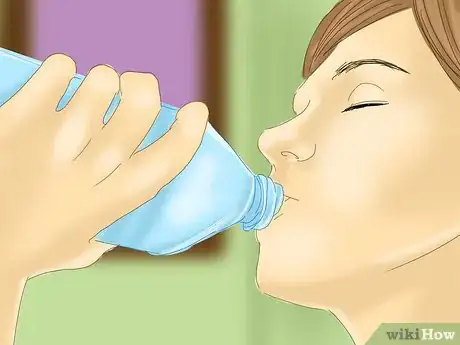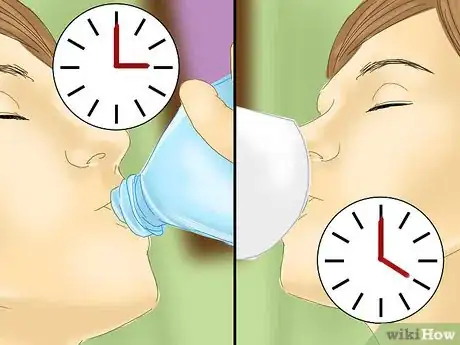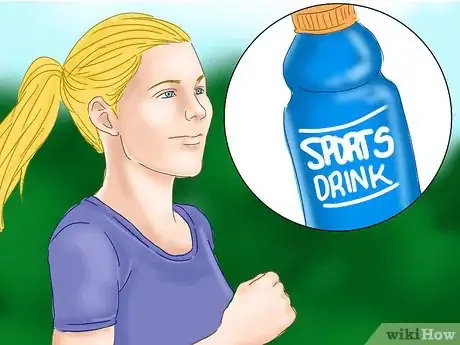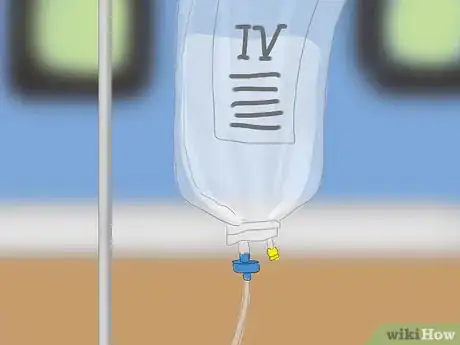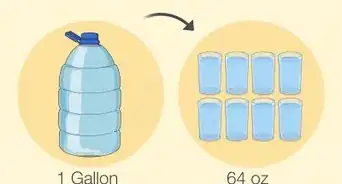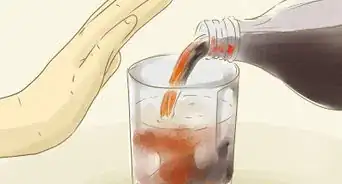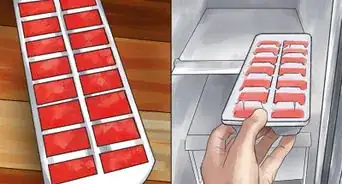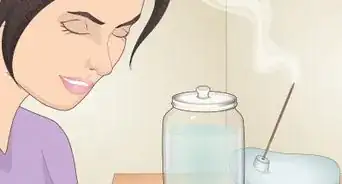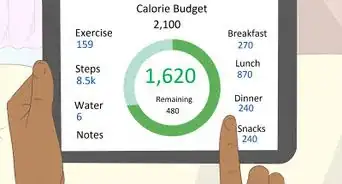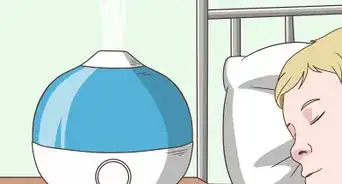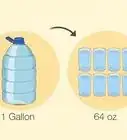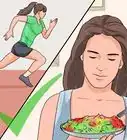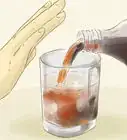This article was co-authored by Olivia Mitchell, RDN, IFNCP. Olivia Mitchell is an Integrative and Functional Nutrition Certified Practitioner (IFNCP™) and a Registered Dietitian Nutritionist (RDN) with a focus on women's hormones and fertility. Olivia has her virtual practice where she helps her clients dive deeper into often overlooked causes of infertility with a customized diet, lifestyle, and supplement changes. She is also the co-founder of the Natalwork and Lead Nutrition Coach with On The Goga. Olivia received her Bachelor’s degree in Nutrition Sciences from West Chester University of Pennsylvania and her RDN from The University of Houston.
There are 7 references cited in this article, which can be found at the bottom of the page.
This article has been viewed 91,570 times.
Dehydration can occur not only as a result of not drinking enough water, but also as a side-effect of conditions such as heat stroke, diabetes, diarrhea, and vomiting.[1] Symptoms of dehydration may include thirst, lightheadedness, dizziness, confusion, infrequent and dark urination, dry mouth, dry skin, fatigue, and, in more severe cases, increased heart rate and breathing.[2] Whether you are severely dehydrated from an illness, or simply seeking to add greater hydration into your life as a measure of health, with the right strategy you will be able to achieve your goal.
Steps
Trying At-Home Methods
-
1Drink more water.[3] Many people do not consume the daily recommended water intake each day. Anywhere between eight to 15 cups of water per day is recommended, depending upon your activity level and other factors such as your body weight and exposure to the sun or warm temperatures. Aim to consume at least eight cups of water each day, unless otherwise advised by a medical professional.
- Besides plain water, you can drink water with some fruit added, sparkling water, or herbal teas.[4]
-
2Drink smaller amounts more frequently. If drinking enough water is a challenge for you, spreading it out throughout the day can make it easier for your system to handle. Carry a water bottle with you during your work day, or have a glass of water beside you when you are relaxing at home. If you keep it in close proximity, you will be more likely to sip on it throughout the day. Before you know it, you will be on your way to reaching your hydration goals.
- Note that even when you don't feel thirsty, it is important to keep your fluids up.
- Also, just because it is cold does not mean that you don't need additional fluids — exertion, fierce weather, dryness, etc., can all contribute to becoming dehydrated.
- If you experience thirst that is unsatisfied by drinking fluids, this may indicate an underlying condition, such as diabetes, or you may be experiencing thirst as a side effect of medication. Talk to your doctor if you are experiencing these issues.
Advertisement -
3Compensate for fluid loss after working out. Many people underestimate the amount of fluid lost in sweat when they go to the gym or do another form of exercise. It is recommended to drink one to three cups of water prior to beginning your exercise routine, and to carry a water bottle with you as you work out. You can substitute water with a sports drink to replenish your electrolytes (which include salt) as well, as you also lose salt when you sweat (and many sports drinks contain calories that will fuel you to perform better during a tough workout).
- For endurance sports, an electrolyte beverage is key as salt is vital to your body's ability to absorb water.[5]
- For shorter workouts, regular water should suffice.
-
4Monitor how much time you are spending in the sun. The more time you spend in hot weather, the greater your body's need for fluid replenishment will be.[6] To stay hydrated in the hot weather, carry fluids with you. If at all possible, schedule your outdoor activities for the early mornings or the late afternoons when the sun is less strong, as this will decrease your rate of dehydration.
- If you work out outdoors and also live in a place with a hot climate, you may choose to do workouts at times of the day when it is cooler out. This will make it easier for you to maintain adequate hydration without having to consume huge volumes of fluid.
-
5Avoid sodas, caffeinated beverages, and/or alcohol for hydration purposes. Often when people are sick, they turn to sodas such as ginger ale to settle their stomach. These, however, are an ineffective choice if you are trying to combat dehydration. This is because they contain too much sugar and too little sodium to replenish electrolytes.[7]
- Alcohol is a diuretic, meaning it increases fluid loss from the body — you may urinate more fluids than you actually drink. The headache you feel when you're hungover is a direct result of dehydration. If you're drying to hydrate, avoid alcohol.[8]
- Caffeinated beverages have a mild diuretic property. While this should not cause dehydration, if you are trying to hydrate your body, caffeinated beverages are not the most effective choice. Stick with straight water instead.[9]
-
6Check your urine as a sign of your hydration status.[10] Dark-colored urine (a dark yellow), particularly if accompanied by infrequent urination, is a sign of dehydration.[11] On the other hand, frequent light-colored urine is a sign that your body is well-hydrated. Don't be afraid to check in the toilet as it is actually one of the more effective ways to evaluate your body's hydration status.
Seeking Medical Treatment
-
1Recognize signs of severe dehydration. If you are experiencing lightheadedness, dizziness, confusion, or altered vital signs (such as a fast heart rate and an increased respiratory rate), you may have a more severe form of dehydration that warrants professional medical attention. The most common causes of severe dehydration are heat stroke (from spending too much time in the sun), extreme endurance sports, and illnesses that involve diarrhea and/or vomiting.
- If you believe you may have any of these medical conditions, or if you are worried that you may have severe dehydration, it is best to see a doctor sooner rather than later for treatment.[12]
-
2Get IV fluids. IV (intravenous) fluids are the fastest and most efficient way to replace fluids if you are suffering from severe dehydration. This is because the fluid is injected straight into your vein, rather than having to go the long route of being absorbed by your digestive system. IV fluids are also tailored to your specific needs with the perfect balance of fluid, salt, and calories to optimize your body's hydration and overall health.[13]
- If you have an illness such as diarrhea and/or vomiting, you may not be able to consume fluids orally (due to nausea and/or vomiting, or diarrhea which prevents absorption); therefore, IV fluids may be your only option in severe cases.
-
3Get a diagnosis for the underlying cause of your dehydration. It is important to understand that severe cases of dehydration require not only fluids for treatment, but also diagnosing and resolving the underlying cause of the dehydration — a job best accomplished by an experienced physician. If you try to rehydrate yourself without first identifying the cause of the problem, it is unlikely to lead to a long-term or permanent solution; therefore, if in doubt it is best to see a doctor who can guide you through the steps to getting properly hydrated and in good health once again.[14]
- The specific diagnosis underlying dehydration also affects the treatment course, in many cases. This is another reason why identifying the underlying cause is key.
- If you suffer from a chronic disease such as congestive heart failure, kidney disease, an endocrine disorder, or hyponatremia it can be dangerous for you to make changes to your daily fluid intake. Speak with your physician about what is appropriate for you, and keep in mind that the recommendations for the general population will not necessarily apply.
Expert Q&A
-
QuestionWhat about dehydration and chemotherapy?
 Timothy Sherman, RNTimothy Sherman is a Registered Nurse (RN) based in Austin, Texas and affiliated with St. David's HealthCare. With over seven years of nursing experience, Timothy specializes in working with adults in a general medical/surgical setting, chemotherapy, and with biotherapy administration. He has also instructed Essentials of Medical Terminology and Anatomy and Physiology for Medical Assistants at Austin Community College. He received his BS in Nursing from Wichita State University in 2012.
Timothy Sherman, RNTimothy Sherman is a Registered Nurse (RN) based in Austin, Texas and affiliated with St. David's HealthCare. With over seven years of nursing experience, Timothy specializes in working with adults in a general medical/surgical setting, chemotherapy, and with biotherapy administration. He has also instructed Essentials of Medical Terminology and Anatomy and Physiology for Medical Assistants at Austin Community College. He received his BS in Nursing from Wichita State University in 2012.
Registered Nurse Adequate hydration is a absolute necessity for many individuals undergoing chemotherapy to reduce the risk of damage from the medication to the urinary system. Appropriate foresight can prevent dehydration with chemotherapy. Nausea/vomiting is a very common side effect of chemotherapy which can lead to dehydration. Medical intervention prior to dose administration and during the administration of chemotherapy agents can help prevent dehydration from this side effect. If necessary, chemotherapy can be administered in conjunction with IV hydration in an outpatient clinic or inpatient setting to ensure adequate hydration.
Adequate hydration is a absolute necessity for many individuals undergoing chemotherapy to reduce the risk of damage from the medication to the urinary system. Appropriate foresight can prevent dehydration with chemotherapy. Nausea/vomiting is a very common side effect of chemotherapy which can lead to dehydration. Medical intervention prior to dose administration and during the administration of chemotherapy agents can help prevent dehydration from this side effect. If necessary, chemotherapy can be administered in conjunction with IV hydration in an outpatient clinic or inpatient setting to ensure adequate hydration.
References
- ↑ http://www.hopkinsmedicine.org/healthlibrary/conditions/non-traumatic_emergencies/dehydration_and_heat_stroke_85,P00828/
- ↑ https://www.nlm.nih.gov/medlineplus/dehydration.html
- ↑ https://www.nlm.nih.gov/medlineplus/dehydration.html
- ↑ Olivia Mitchell, RDN, IFNCP. Integrative & Functional Nutrition Certified Practitioner. Expert Interview. 22 June 2021.
- ↑ https://www.nlm.nih.gov/medlineplus/dehydration.html
- ↑ http://www.hopkinsmedicine.org/healthlibrary/conditions/non-traumatic_emergencies/dehydration_and_heat_stroke_85,P00828/
- ↑ http://www.mayoclinic.org/diseases-conditions/dehydration/basics/prevention/con-20030056
- ↑ http://www.nhs.uk/Conditions/Dehydration/Pages/Causes.aspx
- ↑ http://www.mayoclinic.org/healthy-lifestyle/nutrition-and-healthy-eating/expert-answers/caffeinated-drinks/faq-20057965
- ↑ http://www.mayoclinic.org/diseases-conditions/dehydration/basics/prevention/con-20030056
- ↑ Olivia Mitchell, RDN, IFNCP. Integrative & Functional Nutrition Certified Practitioner. Expert Interview. 22 June 2021.
- ↑ http://www.mayoclinic.org/diseases-conditions/dehydration/basics/treatment/con-20030056
- ↑ http://www.hopkinsmedicine.org/healthlibrary/conditions/non-traumatic_emergencies/dehydration_and_heat_stroke_85,P00828/
- ↑ http://www.hopkinsmedicine.org/healthlibrary/conditions/non-traumatic_emergencies/dehydration_and_heat_stroke_85,P00828/
